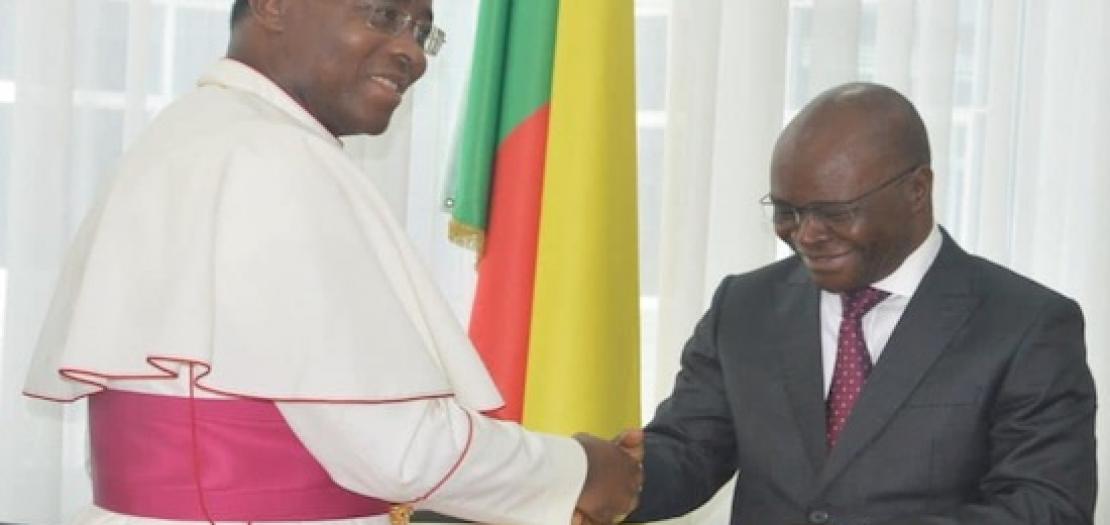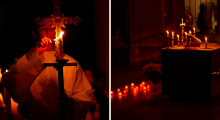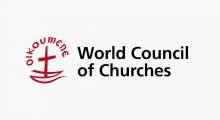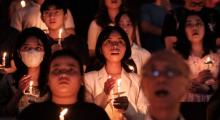Issued by the Catholic Center for Studies and Media - Jordan. Editor-in-chief Fr. Rif'at Bader - موقع أبونا abouna.org

It is the official recognition of the Catholic Church's moral and spiritual authority, in favor of justice, peace and development, says an expert in civil and canon law.
Father Fulgence Mehouenou, a priest in the Archdiocese of Parakou, in northern Benin, and an expert in civil and canon law, spells out the details of the Aug. 23 accord in an interview with La Croix Afrique.
La Croix Africa: What are the key points of the framework accord that the Republic of Benin and the Holy see ratified on Aug. 23?
Father Fulgence Mehouenou: This framework agreement is a convention under international law that establishes “the legal framework for relations between the Holy See and the Republic of Benin, and between the Church and the state in Benin.”
It recognizes, guarantees and protects the fundamental right of religious freedom, which includes the right to freedom of religion, freedom of expression and freedom of demonstration.
The agreement’s significant advances include the recognition, under Beninese law, of the private and public legal personality of the ecclesial entities identified in canon law as legal persons, and also the respect for places of worship and Catholic identity.
The agreement also guarantees, among other provisions, the State’s obligation not to interfere in appointments and in the apportionment of ecclesiastical charges.
With regard to public interest initiatives taken by the Catholic Church in Benin, the agreement recognizes the right to education by guaranteeing respect for the proper character of Catholic education.
It guarantees the right to create educational, vocational training, charitable, and social assistance institutions in accordance with Beninese legislation.
In addition, the Church can now count on a state financial contribution yet to be defined, as well as guarantees about land, and concessions on taxes and levies.
Is this a sign of Benin’s recognition of the Church?
It is proof of the official recognition of the Catholic Church's multi-secular commitment to religious freedom and its diplomatic contribution, as a moral and spiritual authority, in favor of justice, peace and development.
Other factors justify this mark of recognition by the State of Benin, namely the large number of Catholics within Benin’s population, the well-entrenched presence of Catholic charitable and social assistance institutions in Benin.
Lastly, there is the existence of diplomatic relations between the Holy See and the State of Benin, with the accreditation of a papal legate in Benin and of a Beninese ambassador of Benin at the Vatican.
What is the attitude of the Church in Benin to the proliferation of new religious groups?
Several principles characterize the constitutional status of religions in Benin, namely the freedom of religions under a Beninese regime of religious pluralism in a secular state, the legal equality of religions and, finally, religious groups’ freedom of expression and of works.
The problem is the definition of what the Beninese legislature means by “religion,” “religious groups” and “religious communities.”
Are sects also “religious communities” like the great monotheistic religions?
New religious groups tend to abuse the right to religious freedom and freedom of religion. Freedom of religion implies the duty to respect others’ religion.
That is why there are situations where the authorities are even allowed to impose legal restrictions on the exercise of freedom of religion.
Nevertheless, the Catholic Church in Benin is doing well. There are certainly difficulties and problems, but this is the way of all life and of any organized society.
The strength of the Catholic Church for 2,000 years has been that is above all a human-divine work, and Satan, the accuser, cannot destabilize it.
Many of those who leave the Catholic Church come back and ask to be readmitted. The church must for them be the face of divine mercy.







